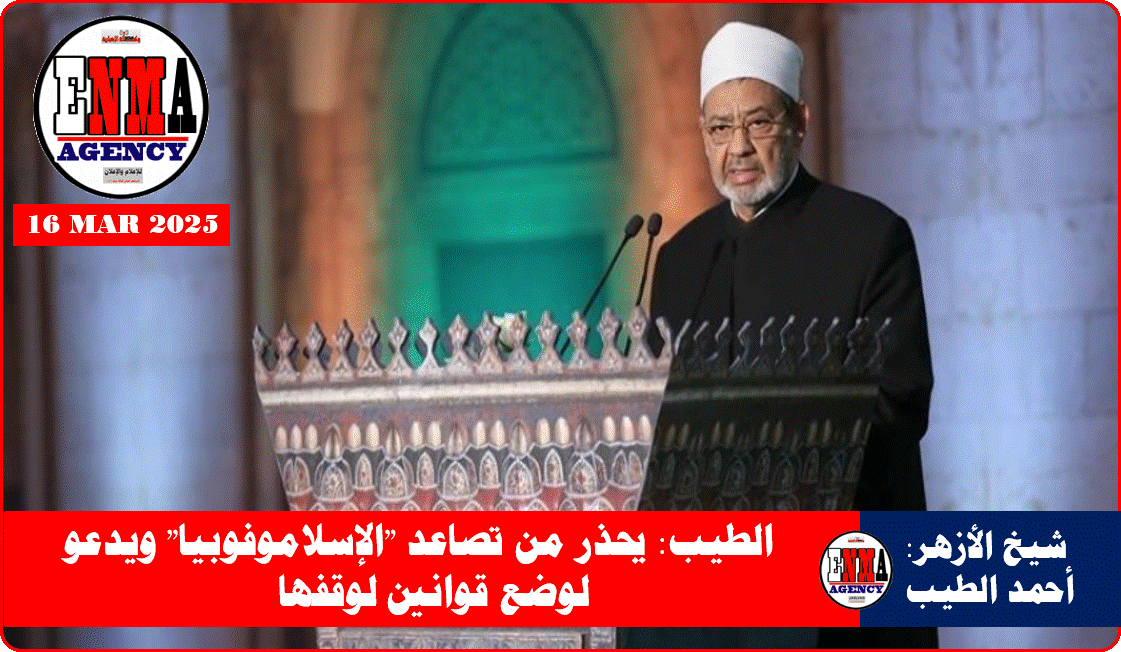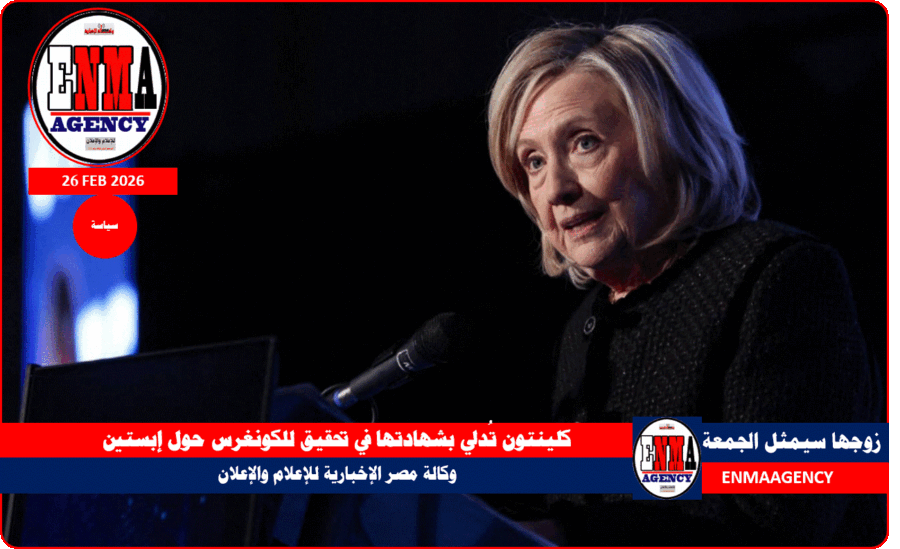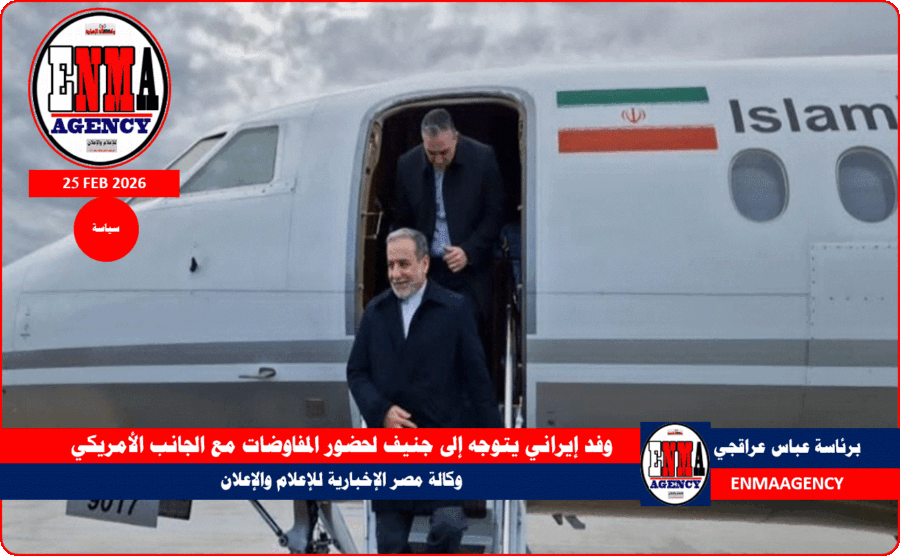شيخ الأزهر يحذر من تصاعد “الإسلاموفوبيا” ويدعو لوضع قوانين لوقفها

شيخ الأزهر الدكتور أحمد الطيب
وكالة مصر الإخبارية للإعلام والإعلان| الأحد 16 مارس 2025م
حذر شيخ الأزهر أحمد الطيب، من تصاعد ظاهرة الإسلاموفوبيا، داعياً لوضع قوانين لوقفها.

جاء ذلك في كلمة الطيب بالجمعية العامة للأمم المتحدة بمناسبة الاحتفال باليوم العالمي لمكافحة الإسلاموفوبيا، ألقاها نيابةً عنه السفير أسامة عبد الخالق مندوب مصر الدائم لدى الأمم المتحدة، وفق بيان للأزهر، الأحد.
وقال الطيب، وهو أيضا رئيس مجلس حكماء المسلمين في العالم “الاحتفاء باليوم العالمي جاء تتويجًا لجهود مشكورة تحملت عبئها مجموعة الدول الإسلامية لدى الأمم المتحدة لمواجهة هذه الظاهرة”.
ووصف ظاهرة الإسلاموفوبيا بأنها “غير معقولة ولا منطقية، حيث باتت تمثل تهديدًا حقيقيًّا للسِّلم العالمي”.
وأشار إلى أن كلمة “الإسلام” مشتقة من نفس كلمة السلام بالعربية، وهي تعبير عن القيم التي جاءت بها رسالة هذا الدين الحنيف، بما في ذلك الرحمة والمحبة والتعايش والتسامح والتآخي بين الناس جميعًا على اختلاف ألوانهم وعقائدهم ولغاتهم وأجناسهم.
وبين شيخ الأزهر أن “الإسلاموفوبيا أو ظاهرة الخوف المرضي من الإسلام، لم تكن إلا نتاجًا لجهل بحقيقة هذا الدين العظيم وسماحته، ومحاولات متعمدة لتشويه مبادئه التي قوامها السلام والعيش المشترك”.
وشدد أن ظهور الإسلاموفوبيا هو “نتيجة طبيعية لحملات إعلامية وخطابات يمينية متطرفة، ظلت لفترات طويلة تصور الإسلام على أنه دين عنف وتطرف، في كذبة هي الأكبر في التاريخ المعاصر، استنادًا لتفسيرات خاطئة واستغلال ماكر خبيث لعمليات عسكرية بشعة، اقترفتها جماعات بعيدة كل البعد عن الإسلام”.
وتساءل: “كيف لهذا الدين الذي لا يكتمل إيمان أتباعه إلَّا بإيمانهم بمبدأ كتابهم المقدَّس الذي خاطب الله به الخليقة كلَّها في قوله تعالى: ﴿يَا أَيُّهَا النَّاسُ إِنَّا خَلَقْنَاكُم مِّن ذَكَرٍ وَأُنثَىٰ وَجَعَلْنَاكُمْ شُعُوبًا وَقَبَائِلَ لِتَعَارَفُوا﴾ [الحجرات: 13]، كيف له أن ينقلب إلى دين يدعو للتطرف والإرهاب والعنف والدماء؟ أليس من الحق والعدل والإنصاف أن يسمى باسمه الحقيقي الذي أراده الله له: دين تعارف وتسامح ورحمة وتعاون؟! وأن يكون التخوُّف منه ومن أتباعه مرضًا تخصَّص له المشافي ودُور الرعاية”.
وفي معرض أسفه لتصاعد موجات هذه الظاهرة، قال شيخ الأزهر: “رغم كل هذه الجهود الكبيرة، ما زالت هذه الظاهرة تتسع – للأسف- وتغذيها خطابات شعبوية لليمين المتطرف تستغل أوجه الضعف الفردي والجماعي، فتذكرنا بأن المعركة طويلة النفس، وأن التحدي يحتم علينا أن نضاعف الجهود، ونبتكر آليات تواكب التعقيدات التي ترافق هذه الظاهرة”.
ودعا شيخ الأزهر إلى وضع تعريف دولي لظاهرة الإسلاموفوبيا، يتضمن تحرير مجموعة من المصطلحات والممارسات المحددة بشكل دوري، وتعبر عن التخويف أو الحض على الكراهية أو العنف ضد الإسلام والمسلمين بسبب انتمائهم الديني.
كما طالب بإنشاء قواعد بيانات شاملة ومحدثة لتوثيق الجرائم والممارسات العرقية والعنصرية ضد المسلمين بسبب دينهم، ورصد القوانين والسياسات التي تشكل تعميقًا للظاهرة، أو تمثل حلولًا تساعد على معالجتها.
وأشار إلى أهمية أن “تهدف في نهاية المطاف إلى صياغة قوانين وتشريعات توقف هذه الظاهرة، وتبعث – بدلًا منها- تعزيز قيم: الحوار والتسامح والتعايش الإنساني”.
وفي 2022، تبنى أعضاء الجمعية العامة للأمم المتحدة البالغ عددهم 193 عضوا بالإجماع قرارا يجعل 15 مارس/آذار من كل عام يوما لمحاربة الإسلاموفوبيا.
ويدعو النص غير الملزم إلى “تكثيف الجهود الدولية لتقوية الحوار العالمي بشأن تعزيز ثقافة التسامح والسلام على جميع المستويات، على أساس احترام حقوق الإنسان وتنوع الأديان والمعتقدات”.
المصدر: مواقع ووكالات منها نعيد النشر ونحفظ حق الناشر بالإشارة وامكانية الوصول

Translation from Arabic to English:
Grand Imam of Al-Azhar, Ahmed Al-Tayeb, warned against the escalating phenomenon of Islamophobia, calling for laws to curb it.
This came in Al-Tayeb’s speech at the United Nations General Assembly during the commemoration of the International Day to Combat Islamophobia, delivered on his behalf by Ambassador Osama Abdel Khalek, Egypt’s Permanent Representative to the UN, according to a statement from Al-Azhar on Sunday.
Al-Tayeb, who also chairs the Muslim Council of Elders, stated, “Marking this international day culminates commendable efforts led by the group of Islamic nations at the UN to confront this phenomenon.”
He described Islamophobia as “irrational and illogical,” noting that it now “poses a real threat to global peace.”
Al-Tayeb pointed out that the word “Islam” is derived from the Arabic word for peace (salam), reflecting the values upheld by this noble faith, including mercy, love, coexistence, tolerance, and brotherhood among all people, regardless of their colors, beliefs, languages, or ethnicities.
The Grand Imam explained that “Islamophobia, or the pathological fear of Islam, stems solely from ignorance of this great religion’s true essence and tolerance, as well as deliberate attempts to distort its principles rooted in peace and shared coexistence.”
He stressed that the rise of Islamophobia is a “natural outcome of media campaigns and far-right extremist rhetoric that have long falsely portrayed Islam as a religion of violence and extremism—a lie that stands as the biggest fabrication in modern history, fueled by misinterpretations and the malicious exploitation of heinous military acts committed by groups utterly alien to Islam.”
Al-Tayeb posed a rhetorical question: “How can this religion, whose followers’ faith is incomplete unless they believe in the principle enshrined in their holy book—where God addresses all creation in the verse: ‘O humanity, We created you from male and female, and made you into peoples and tribes so that you may know one another’ (Quran 49:13)—be twisted into a faith that promotes extremism, terrorism, violence, and bloodshed? Is it not just and fair to call it by its true name, as God intended: a religion of mutual understanding, tolerance, mercy, and cooperation? Should fear of it and its followers not be treated as a pathology requiring hospitals and care centers?”
Expressing regret over the surge in Islamophobia, Al-Tayeb said: “Despite all these significant efforts, this phenomenon continues to expand—unfortunately—fueled by populist far-right rhetoric that exploits individual and collective vulnerabilities. This reminds us that the battle is long and compels us to redouble our efforts, innovating mechanisms to address the complexities accompanying this phenomenon.”
He called for establishing an international definition of Islamophobia, including periodic updates to terms and practices that constitute intimidation, incitement to hatred, or violence against Islam and Muslims due to their religious identity.
Al-Tayeb also urged the creation of comprehensive, up-to-date databases to document crimes and racist practices targeting Muslims for their faith, as well as monitoring laws and policies that deepen Islamophobia or offer solutions to counter it.
He emphasized the importance of “ultimately formulating laws and legislation to halt this phenomenon and, instead, promote values of dialogue, tolerance, and human coexistence.”
In 2022, all 193 member states of the UN General Assembly unanimously adopted a resolution designating March 15 as the International Day to Combat Islamophobia.
The non-binding resolution calls for “intensifying international efforts to foster a global dialogue on promoting a culture of tolerance and peace at all levels, based on respect for human rights and the diversity of religions and beliefs.”
Note: The translation preserves the rhetorical tone, Quranic references, and key terms (e.g., “Islamophobia”) as they appear in the original Arabic. Proper titles and institutional names (e.g., “Grand Imam of Al-Azhar,” “Muslim Council of Elders”) are rendered according to their official English equivalents.






